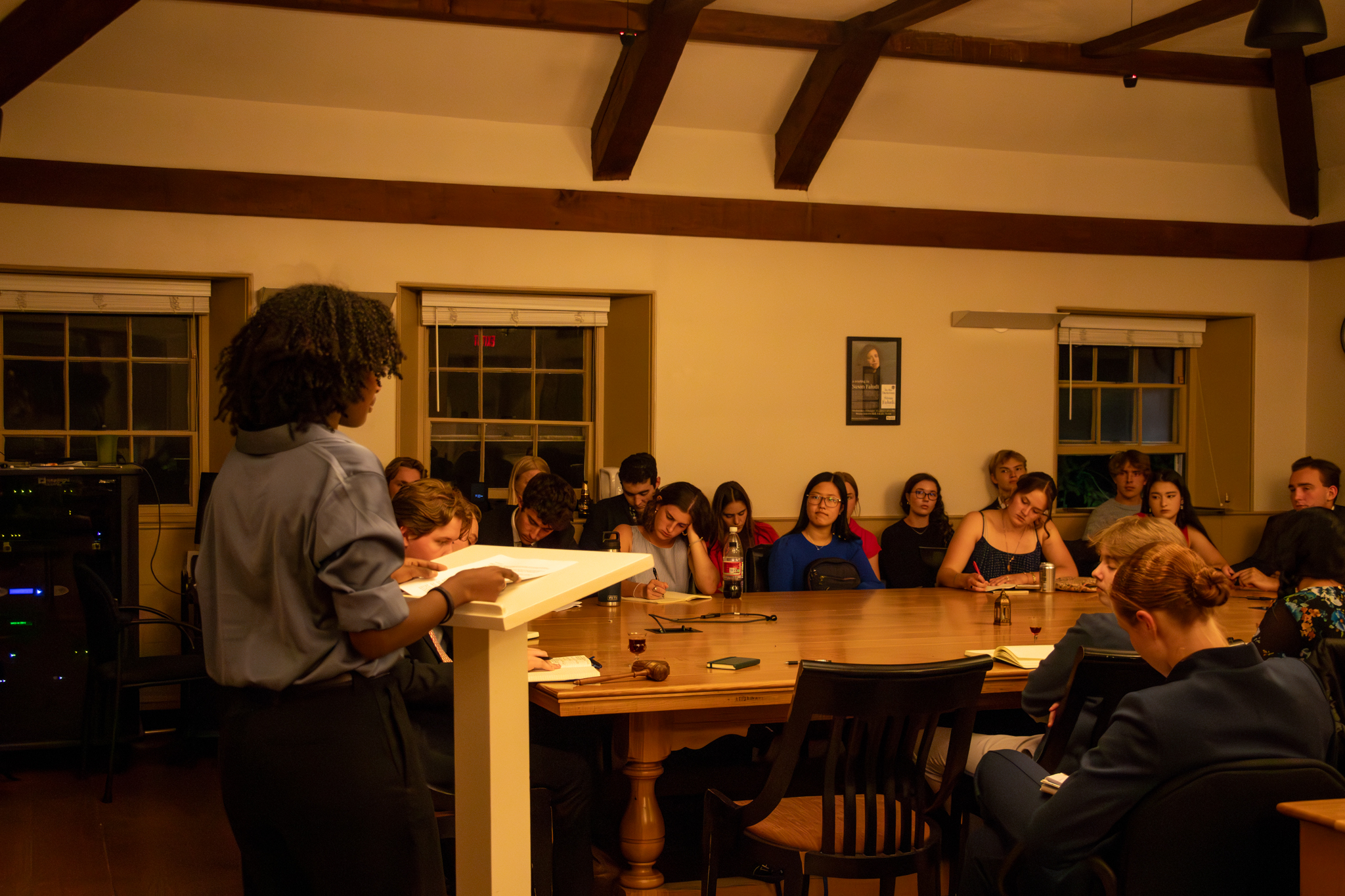Where dispute remains sacred: Peucinian Society celebrates 220th anniversary over Homecoming
October 3, 2025
 Isa Cruz
Isa CruzWhat Mark Mateo ’26 describes as a controversial component of the modern Peucinian Society is also the group’s most time-honored tradition: moderated discourse in which no opinions are dismissed outright.
Founded in 1805 as the Philomathian Society, the Peucinian Society will celebrate its 220th anniversary this Homecoming Weekend as Bowdoin’s oldest student organization. “Peucinian,” derived from the Greek word for “pine,” alludes to the wooded haven that shrouds the College.
In the group’s early years, Peucinian members amassed classic literature and maintained meticulous catalogues in rivalry with their more conservative counterpart on campus, the now-defunct Athenaean Society.
Nevertheless, literary compilation was only half of Peucinian’s mission; the other half could be found in a consistent rotation of members’ dorm rooms, where lively political discourse and philosophical deliberation regularly took place. These days, discourse culminates in a disputation every Thursday night.
During weekly gatherings, speakers present two opening remarks, one in the affirmative and one in the negative for a designated statement. Afterwards, members partake in a moderated discussion that reaches a conclusive vote. Decorum in these meetings is of equal importance to the contentious topics themselves.
“We follow the rules of the discussion, and we speak when we’re called upon,” Charlotte Iannone ’26 said. “I think that having a ritual around debate enshrines it as something sacred.”
Iannone, whose invocation begins each evening, ensures the ongoing relevance of classical literature through poetry readings and book clubs.
“We adhere to our traditions by trying to reflect on classical literature and gain as much as we can from the knowledge of the past,” Iannone said.
Although graduates are encouraged to donate one or two impactful books to the Peucinian’s collection, alumni engagement extends beyond the Peucinian Library cultivated in Sills Hall.
Alumni, recognized as “Guardians,” have long initiated change on campus, and include such figures as Henry Wadsworth Longfellow and Nathaniel Hawthorne. But the impact of Peucinian’s alumni continued beyond the 19th century. Following years of fraternities dictating campus social culture, students reestablished Peucinian as a gathering space in 2007.
Part of this revival on campus included connecting students across the political spectrum. Mateo cites both past members and his roommate, a fellow Peucinian member, as examples of close friends having strikingly different worldviews.
Amidst rampant political polarization nationally, Mateo argues that the group has renewed its commitment to open-minded discourse, which he describes as a rare exception on a campus where he feels disagreement too often marks an end to the conversation.
“We tend to discuss politics and contemporary issues with more freedom and openness than I think you’ll find elsewhere on campus,” Mateo said. “That understandably generates some controversy because we feel as though we’re doing something the College is lacking.”
As a result, Iannone sees Peucinian as an embodiment of the liberal arts education, teaching students to stake themselves to definitive claims and ideologies while retaining the humility to adjust them when appropriate.
“I think one of the best parts of the Peucinian is that you’re forced to contend with your preconceived notions,” Iannone said. “For me, the best disputations are ones where I come in with a very staunch position, and then I realize halfway through that I’m wrong and I have to reconstitute what I think.”
At the same time, Peucinian works to incorporate the modern era into its discussion, including presenting statements that correspond to current controversies. In past years, these statements have included “Artificial intelligence can achieve personhood,” “Abolish the Second Amendment,” and more recently, “Liberty needs no virtue.”
Even with this turn to the 21st century, Mateo emphasized the enduring role of Peucinian in bridging differences on campus for over two centuries.
“If we cease to be tolerant of different perspectives, we probably cease to have a function on campus,” Mateo asserted. “Mutual respect is at the crux of what we do.”
Comments
Before submitting a comment, please review our comment policy. Some key points from the policy:
- No hate speech, profanity, disrespectful or threatening comments.
- No personal attacks on reporters.
- Comments must be under 200 words.
- You are strongly encouraged to use a real name or identifier ("Class of '92").
- Any comments made with an email address that does not belong to you will get removed.

When so much has changed, it’s nice to see some things have stayed the same.